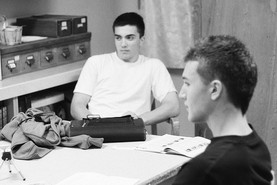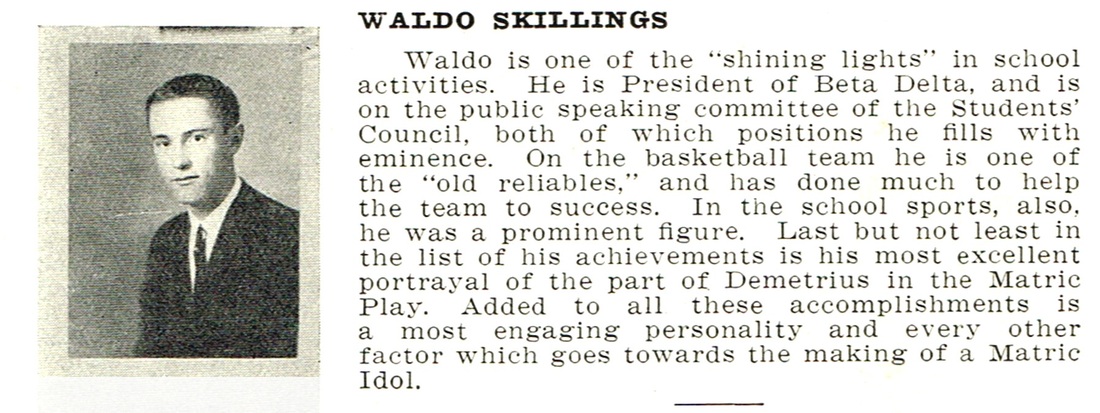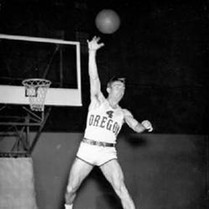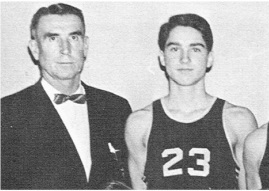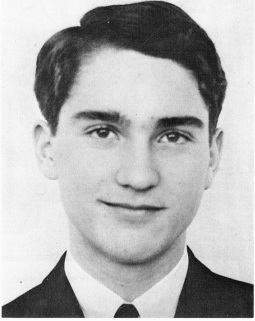Roger Skillings, VHS class of '68
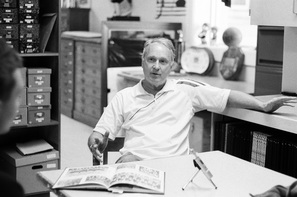
Interviewed by Christopher Kayiatos
& Alex Niketas, VHS class of 2012
Prime Minister of School Parliament
Sports - Totems basketball #23
Roger was interviewed by my partner, Alex Niketas, and I mid-May of 2012. His positive demeanor and eagerness helped us greatly to answer to questions we had. It was a pleasure interviewing a former Victoria High athlete and graduate, and hearing the stories of his life at our age and beyond.
Roger’s mother was born in New Jersey, United States, and his father in England. His dad first immigrated to BC when he was about 3 and has lived in Victoria since. A member of a family of five sons –twelve years younger than the eldest-, he rarely spoke of his experiences growing up here to Roger. Waldo’s father had originally decided to move to Canada to get away from “Old England”, and felt there was something captivating about life here. He started Van & Storage shortly after in the 1800’
Sports - Totems basketball #23
Roger was interviewed by my partner, Alex Niketas, and I mid-May of 2012. His positive demeanor and eagerness helped us greatly to answer to questions we had. It was a pleasure interviewing a former Victoria High athlete and graduate, and hearing the stories of his life at our age and beyond.
Roger’s mother was born in New Jersey, United States, and his father in England. His dad first immigrated to BC when he was about 3 and has lived in Victoria since. A member of a family of five sons –twelve years younger than the eldest-, he rarely spoke of his experiences growing up here to Roger. Waldo’s father had originally decided to move to Canada to get away from “Old England”, and felt there was something captivating about life here. He started Van & Storage shortly after in the 1800’
Roger’s High school years were not all spent at Victoria High. “I came to Vic High in grade 12”; Roger attended a high school in California before Victoria High. “It was a great opportunity.” he noted. “I played a lot of Tennis”. Roger had been granted a Pre-UCLA scholarship in tennis, and was “enjoying life”, had a good time. Unfortunately due to abdominal injuries, decided it would be best to return to Victoria.
Mother graduated from Oak Bay High, and wanted her son to do the same. Later that night when Roger’s father, Waldo, came home he put in his two cents. “No boy of mine is going to Oak Bay High”.
When I introduced the topic of sports Roger really did have all the answers. From championships to rivalries, it was interesting to hear the school’s rich history surrounding sports. “In my graduating year, it was a challenging year for the team” Roger stated. “Started guard, but we lost to Oak Bay.” He agreed with the idea that between Oak Bay and Victoria High there was almost a gentleman’s rivalry, but a rivalry nonetheless. “Because there were no other high schools around, there were really only the two of them, if you’re the only two teams in the finals every year, one year it’s going to be you one year it’s going to be us” Mark Hellman said, weighing in on the interview. “Between ‘55-‘70 there was an intense rivalry” said Roger. “We felt that we we’re from the poorer side of the tracks, and that we were guna work harder and beat them when it counted and that’s what we did.” In ’69 Vic high went on to beat Oak Bay after they were undefeated the whole year in the Finals of the BCs.
Roger reflected on his former coach George “Porky” Andrews. “He was a phenomenal man, and just a great leader. He scared the hell outta all of us, in a nice way. He demanded respect; he had some problems with the teams in the late ‘60s because everybody was going into estrange with drugs and hair and all sorts of things like that. But he came back and he got the team to win the ’69 championship.” “How he got the name porky, you should talk to his wife about that.” Roger said.
Roper gym is named after Bill Roper, George “Porky” Andrews’ teacher and idol. The other gym at Victoria High is named after Andrews.
Mother graduated from Oak Bay High, and wanted her son to do the same. Later that night when Roger’s father, Waldo, came home he put in his two cents. “No boy of mine is going to Oak Bay High”.
When I introduced the topic of sports Roger really did have all the answers. From championships to rivalries, it was interesting to hear the school’s rich history surrounding sports. “In my graduating year, it was a challenging year for the team” Roger stated. “Started guard, but we lost to Oak Bay.” He agreed with the idea that between Oak Bay and Victoria High there was almost a gentleman’s rivalry, but a rivalry nonetheless. “Because there were no other high schools around, there were really only the two of them, if you’re the only two teams in the finals every year, one year it’s going to be you one year it’s going to be us” Mark Hellman said, weighing in on the interview. “Between ‘55-‘70 there was an intense rivalry” said Roger. “We felt that we we’re from the poorer side of the tracks, and that we were guna work harder and beat them when it counted and that’s what we did.” In ’69 Vic high went on to beat Oak Bay after they were undefeated the whole year in the Finals of the BCs.
Roger reflected on his former coach George “Porky” Andrews. “He was a phenomenal man, and just a great leader. He scared the hell outta all of us, in a nice way. He demanded respect; he had some problems with the teams in the late ‘60s because everybody was going into estrange with drugs and hair and all sorts of things like that. But he came back and he got the team to win the ’69 championship.” “How he got the name porky, you should talk to his wife about that.” Roger said.
Roper gym is named after Bill Roper, George “Porky” Andrews’ teacher and idol. The other gym at Victoria High is named after Andrews.
Roger spoke to us about the emotions he felt when returning from California, saying Vic High was a hard year at first. “It was difficult to come back and feel a bit like a failure. However, I got involved in a whole bunch of thing; student politics, sports, clubs, and then it was fun.”
Beta Boys, the next generation of Beta Delta. “It was a group of guys; it was like a High School fraternity if you can call it that. Interesting class of ’68, great group of guys –and girls.”
When asked what kinds of things he would do after school, he said he’d like to ask us the same question. “You hang out with your friends, you go to parties, there’s a lot of activities and sports, and we also had to do some studying. We weren’t quite sure what we were guna do after high school,” he said. “I don’t think there’s that much difference, really. Things haven’t changed that much in the sense of how people interrelate.”
Roger became a very accomplished individual. After finishing high school he went to UBC where the national tennis team was stationed. He started off by taking general arts and sciences, physics, calculus, English, French, and economics. He then chose to go into teaching and obtained his Bachelors in education and Masters in science and recreation management. Initially a teacher, the first school he taught at was Victor St. School where he taught mentally challenged students for four months. “It was incredibly challenging,” he said. Roger tried incorporating music with number into his lessons. “It didn’t work; they did it great for a few weeks. And then it got to the end and they were no better than they were at the very beginning. It was very difficult for me to go through that, to be able to work with people that have a difficult time conceptually, and mentally, and emotionally. But it was also a wonderful learning experience for me, it was tremendous. Because when I was in high school there were no mentally disturbed, no mentally challenged students, no Autism, no Asperger’s, no wheelchairs, no color.” Roger went on to say however that he never noticed any racism towards Orientals that were at the school; even to this day as a student here I can say it is just as accepting as it was in the ‘60s.
Beta Boys, the next generation of Beta Delta. “It was a group of guys; it was like a High School fraternity if you can call it that. Interesting class of ’68, great group of guys –and girls.”
When asked what kinds of things he would do after school, he said he’d like to ask us the same question. “You hang out with your friends, you go to parties, there’s a lot of activities and sports, and we also had to do some studying. We weren’t quite sure what we were guna do after high school,” he said. “I don’t think there’s that much difference, really. Things haven’t changed that much in the sense of how people interrelate.”
Roger became a very accomplished individual. After finishing high school he went to UBC where the national tennis team was stationed. He started off by taking general arts and sciences, physics, calculus, English, French, and economics. He then chose to go into teaching and obtained his Bachelors in education and Masters in science and recreation management. Initially a teacher, the first school he taught at was Victor St. School where he taught mentally challenged students for four months. “It was incredibly challenging,” he said. Roger tried incorporating music with number into his lessons. “It didn’t work; they did it great for a few weeks. And then it got to the end and they were no better than they were at the very beginning. It was very difficult for me to go through that, to be able to work with people that have a difficult time conceptually, and mentally, and emotionally. But it was also a wonderful learning experience for me, it was tremendous. Because when I was in high school there were no mentally disturbed, no mentally challenged students, no Autism, no Asperger’s, no wheelchairs, no color.” Roger went on to say however that he never noticed any racism towards Orientals that were at the school; even to this day as a student here I can say it is just as accepting as it was in the ‘60s.
“Throughout my entire 12 months of high school I never stepped foot once in Faery Tech,” Roger commenting on the kind of cliques that was present while he was a student.
When asked what drew Roger to becoming prime minister of school parliament, he explained how he had felt poorly about not reaching his excellence in sports. His friends claimed the school needed more school spirit, and Roger seemed to be just the man to help. “I think it made me feel better about life,” he said. Beforehand however, Roger had always been interested in politics. “My dad was politics all the way through my entire life. City council, school board, MLA’s.”
“It’s the last time, from a social economic basis, everybody’s together,” the closing thought Roger Skillings left us with.
Christopher Kayiatos
2012
Go Back to Home Page
When asked what drew Roger to becoming prime minister of school parliament, he explained how he had felt poorly about not reaching his excellence in sports. His friends claimed the school needed more school spirit, and Roger seemed to be just the man to help. “I think it made me feel better about life,” he said. Beforehand however, Roger had always been interested in politics. “My dad was politics all the way through my entire life. City council, school board, MLA’s.”
“It’s the last time, from a social economic basis, everybody’s together,” the closing thought Roger Skillings left us with.
Christopher Kayiatos
2012
Go Back to Home Page
